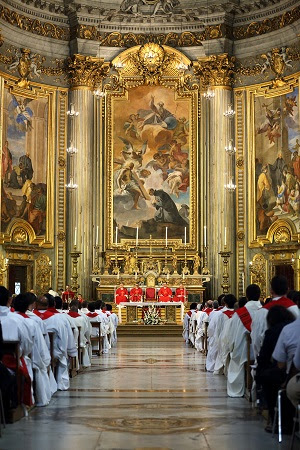Dear Brothers and Sisters,
Having listened this afternoon to the parable of the Good Samaritan, let us try for a moment to avoid the immediate tendency to want to identify ourselves with the person who looked on and who had compassion.
I would propose to you to do together an exercise of identification with that man who has fallen among the thieves, who has been robbed, covered with blood and has been abandoned half dead. Let us imagine ourselves exactly like that, left alone, almost without life, along the road from Jerusalem to Jericho at the time of Jesus. For now, we are this abandoned man.
 Surely there come to mind many disparate thoughts: I will never see my family or my friends again; I am going to die here on the road; no one will know my fate; I will be eaten by wild animals; I will not even have a grave. But right in the middle of these thoughts, with my face covered with blood and the tears streaming down, I see a priest who is going along the same road. Now he is closer. Surely, he will see me. He will help me. I can hope. But what is happening? I cannot believe it. This priest does see me. I am sure that he sees me, but he is passing on the other side, indifferent to my suffering, to my calls for help, to my moaning.
Surely there come to mind many disparate thoughts: I will never see my family or my friends again; I am going to die here on the road; no one will know my fate; I will be eaten by wild animals; I will not even have a grave. But right in the middle of these thoughts, with my face covered with blood and the tears streaming down, I see a priest who is going along the same road. Now he is closer. Surely, he will see me. He will help me. I can hope. But what is happening? I cannot believe it. This priest does see me. I am sure that he sees me, but he is passing on the other side, indifferent to my suffering, to my calls for help, to my moaning.
Further away now, I see another traveler who is going along the same road. After all, I think, this may be a dangerous road but it is heavily traveled. This time it is a Levite. I can hope again, my heart beats stronger. But the same thing happens; I am certain that he sees me and he passes by on the opposite side. It is another indifferent person, encircled by his own priorities. Who knows what they might be? My desperation now is total. It will happen just as I feared. I will die abandoned. No one will come to my aid. This is the end.
Incapable of moving by myself, I feel my strength leaving me. I am without hope when I become aware that there is a Samaritan who is passing by. But, I think if two from my own people have not given me help, no stranger is going to do it. It is useless to make him hear my groans; I am almost tempted to hide myself in shame. Well, I have made a mistake. The Samaritan sees me and feels compassion for me. He stops, he comes near, he binds up my wounds, he takes me to an inn and attends to me. The following day I am still without my strength but I feel as if I have been reborn. He is about to leave but I manage to hear the instructions that he gives to the innkeeper: “Spend on him whatever is necessary, and I will pay you when I return.”
Now I remain alone with my thoughts. This compassionate man has given me back my life. He has saved me, just like God saves His people. Perhaps this Samaritan, this stranger, has been truly sent by God! Now how can I make him understand how grateful I am when I don’t even know his name! And then I seem to hear a voice that says to me, “Go and do likewise.”
Let us return now to the Church of St. Ignatius! So, what about us? Yes, surely we too should do likewise. However, we do it because we also have had the experience of having been saved by the Good Samaritan who is Christ himself. We are indeed that man who has been abandoned along the road whom the Lord approaches every day with compassion, trusting ourselves to the Church, the community of brothers and sisters that cares for us.
We ourselves want to do the same thing, approaching others and having compassion, because it is the only way that we can show our gratitude. To do the same thing, without regard to who might be our neighbor; to do the same thing, putting aside the temptation to pass by on the other side; to do the same thing, without hurrying to be a good Samaritan before feeling ourselves saved by his compassion. “Do this and you will live.”
As St. Paul writes in the passage from the letter to the Galatians that we have heard, this is the Gospel. There is no other. This is also the Gospel which was lived and preached by two great witnesses from our own time, former students of our University, Pope Paul VI and Mons. Oscar Romero whom in a short time we will have the great joy of seeing canonized. We ask for their intercession for this academic year. Finally, this is the Gospel that can attract the young people who are at the center of the reflections of the Synod of Bishops; it is the Gospel that might be the guide in their times of doubt. Above all, it might be the guide for their radicalness, their audacity and their nonconformity.
Dear brothers and sisters, that this might be the Gospel lived, studied and preached by us also in our Gregorian University community during the academic year which we are about to begin.
Church of St. Ignatius, October 8, 2018
Nuno da Silva Gonçalves, SJ


